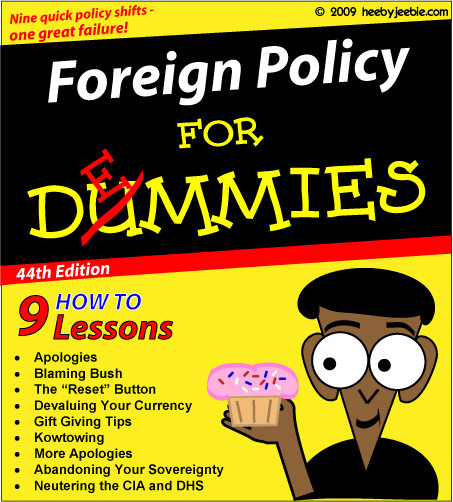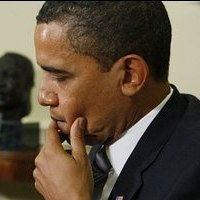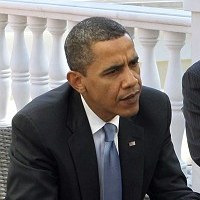![]()
Mon, May 16 2011 | Rubin Reports | By Barry Rubin
The Foreign Policy Elite and Bureaucracy Starts Parting Ways with Obama
“Please release me let me go
for I don’t love you anymore
To waste our lives would be a sin
Release me and let me love again.”— “Please Release Me Let Me Go”
Perhaps the most important policymaking development of the last month has been President Barack Obama’s increasingly visible loss of a lot of the foreign policy elite, including considerable segments of the State and Defense departments. Why this is happening is one of the most interested — and highly neglected — stories of this period.
Consider the factors involved:
— Most of the foreign policy elite is liberal and for this reason they were enthusiastic about Obama and contemptuous of his predecessor, George W. Bush. You already know a lot of this story. Obama combined several irresistible qualities for them including being apparently polished, cosmopolitan, and “smart.”
Of special importance, Bush had embarrassed them in front of the foreigners they dealt with. They were ashamed of his policies. If America was unpopular, they were unpopular. That’s why the idea that Obama would make foreigners love America again was of such huge importance for them.
But now Obama is embarrassing them because while Bush was disliked as a reckless cowboy, now Obama is seen as something just as bad: a naïve amateur.
— There is something of huge importance that few people understand in the distinction between those who focus on domestic policy and those who deal professionally with international affairs. Domestic policy elite members can be liberal or leftist to an unlimited extent. Since all of the factors are within the American system, they can believe that everything is controllable and everything is doable. They can also identify the “enemy” as political opponents within the system, meaning those who are rich, corporations, etc.
To be part of the foreign policy elite, however, is very different.
First, one must possess an element of realism. You cannot, in contrast to domestic staff or experts, merely imagine the ideal health policy according to your theories or believe that spending can be unlimited. Instead, you must deal with existing situations in which information, control of events, and resources are limited.
Idealism, at least openly expressed, is not respected. Someone who insists that solutions are painless and cheap is more likely to be sneered at than cheered at. At some point the facts smash down the door.
Second, it is much harder to cover up mistakes for very long because they are just too visible and undeniable. Consider the Egyptian revolution. One might have insisted that it was wonderful in February but not possible to do so in May. You can maintain that revolutionary Islamism is not a real threat before September 11 but it is harder to do so afterward.
Professionals have to deal with the uses of power and violence — which is why the left’s answer to a serious study of international affairs is the joke subject of conflict resolution — of containment, credibility, and commitment.
S. Powers may sit in the White House and talk about protecting foreign civilians as the highest priority of U.S. policy but those who have to deal with such issues must ask the question: How do we decide where that applies? And they might also remember little examples of that philosophy like Somalia.
Can the foreign policy elite so easily forget the importance of maintaining allies and the fundamental principle of helping your friends and hurting your enemies? They loved Obama for stressing multilateralism — a large part of their job is building such links — but are starting to be cross with him for abandoning American leadership and sabotaging the relationships they have spent lifetimes building.
Or, to put it in a single sentence, it is far easier — and more rewarding career-wise — to be pragmatic and moderately liberal rather than starry-eyed and too far to the left. Where a domestic affairs Obama groupie may get a thrill up his leg from the president, American allies and hence large elements of the foreign policy elite gets the feeling of a noose around their necks.
Third, some specific aspects of international affairs contribute further to the need to be realistic and tough-minded. There are quite a few academics who hate America but are teaching about international affairs and various parts of the world. Yet off-campus and in the actual world a certain element of patriotism is hard to ignore. The enemies are more likely to be external, foes of America, and the priorities are supposed to relate to strategic and economic interests.
There was a British joke -that shows us the key point here: We have the agriculture ministry for the farmers, the labor ministry for the unions, and the Foreign Ministry for the foreigners. Ah, but which foreigners?
Here is where the concept of “clientitis” comes in. Professionals tend to become advocates for those they deal with. That’s why Middle East experts, for example, are generally “pro-Arab” and “anti-Israel.” These people have based their entire strategy on building alliances with more moderate Arab regimes, namely Egypt, Jordan, Saudi Arabia, the smaller emirates, and so on.
They don’t like revolutionary Islamists because they want to overthrow their friends and change the societies where they feel comfortable, aside from the threats to U.S. interests. Islamists have in the past targeted them for murder.
And so when their own government starts being nice to radical Islamists and overthrow — or abandons — their friends it makes them angry. The Saudis, for example, scream at them privately that the U.S. government has taken leave of its senses. Why is Washington dumping them in favor of Iran or Syria? Why should we pay you lobbyists, do deals with American companies, be nice to you diplomats and officers if Obama shows such disrespect for us?
Indeed, policies can make one’s work harder and put one’s life at risk. That’s a big reason why a lot of foreign policy elite people hated Bush: their European contacts mocked America; their Muslim ones got angrier at America.
Let’s say, for example, that people working in the armed forces and Department of Defense started concluding that the war in Libya made their job impossible because they can’t fight three wars with the existing resources. Or that administration grandstanding to win reelection placed counterterrorism forces and intelligence-fathering at risk because it released too much information.
At that moment the member of the foreign policy elite starts rethinking his previous views of the president. People who deal with Central Europe hear complaints about Obama and Russia; those in Africa hear about this unfathomable neglect by the first “African-American” president; in Latin America they speak of Venezuela and in Asia of China.
Even in Western Europe, where Obama’s snob appeal was highest, there are now once again sneers about an inept American president who is so frustrating because he is, in his own way, another provincial American.
Of course, the military and those around it tend to be more conservative from the start. Yet much of the military and strategic foreign policy elite resented Bush’s Iraq war as either unnecessary or wrongly conducted.
Now they deal with a president who has involved them in a new, ill-defined war that literally not a single Pentagon official wants. He is unsympathetic to their culture and is now forcing them to spend as much time on sensitivity to gays as they have for life-and-death skills. The last Quadrennial Review — the Pentagon’s most important planning document — spent a lot more time on fuel efficiency and “green energy” than on terrorism. Many of them are starting to think that the war in Afghanistan is unwinnable and not worth pursuing.
Has anyone really thought through the implications of Leon Panetta being named as secretary of defense? Obama has already put in a colorless, inexperienced political hack as national security advisor (sorry to be mean but a lot of lives are at stake here). Here is the account of his hometown newspaper, the Monterey County Herald, about Panetta’s background:
“Panetta served eight terms in Congress, representing the Monterey area. In Washington, D.C., he earned a reputation as a budget hawk, working on budgetary matters, environmental causes and civil rights issues. He also repeatedly voted against President Ronald Reagan’s military initiatives, particularly the administration’s program of aiding Contra rebels in Nicaragua.
“He led an unsuccessful effort to convince the military to keep Fort Ord open, then presided over early reuse planning for the base. He also wrote legislation creating the Monterey Bay National Marine Sanctuary.”
In other words, someone who has no real background or knowledge on defense issues; a budget-cutter (good in principle but won’t endear him at the Pentagon); historically focused on environmental and civil rights issues; and no friend of the armed forces except when it comes — hypocritically — to wasting money for his own district.
Oh, that’s going to work out real well!
This is only the beginning of discontent. Obama simply isn’t the inspiring leader on international affairs that they expected. And this unhappiness spills over into the media. If you want to see a prime example of this phenomenon, read Michael Gerson’s Washington Post article entitled, “Obama’s serial indecision on the Middle East.”
It is devastating for anyone — and that means everyone — used to the idea that the media is in love with Obama and he can do no wrong in their eyes. Here’s a sample quotation:
“It is no longer credible to blame these failures on inexperience — an argument that years of experience tends to undermine. A novice can learn from his mistakes. Obama apparently doesn’t view these outcomes as mistaken.”
Once the foreign policy elite concludes a president cannot learn then they cannot enthusiastically support him. That doesn’t mean they will act politically against him. But their options are limited to: trying to mitigate the damage he’s doing, resign if they are appointees, or seek an alternative president if a better option seems available. And, of course, leak their discontent to journalists whenever possible to make it clear that the mess isn’t their fault.
The honeymoon is over. Divorce proceedings are beginning.
About the author,
Barry Rubin is director of the Global Research in International Affairs (GLORIA) Center, editor of the Middle East Review of International Affairs (MERIA) Journal, and a featured columnist at PajamasMedia http://pajamasmedia.com/barryrubin/ His latest books are The Israel-Arab Reader (seventh edition), The Long War for Freedom: The Arab Struggle for Democracy in the Middle East (Wiley), and The Truth About Syria (Palgrave-Macmillan). The website of the GLORIA Center is http://www.gloria-center.org. His PajamaMedia columns are mirrored and other articles available at http://www.rubinreports.blogspot.com/.



 RSS
RSS












The Foreign Policy Elite and Bureaucracy Starts Parting Ways with #Obama | #USA #tcot #jcot http://j.mp/l4jgbO
RT @CrethiPlethi: The Foreign Policy Elite and Bureaucracy Starts Parting Ways with #Obama | #USA #tcot #jcot http://j.mp/l4jgbO